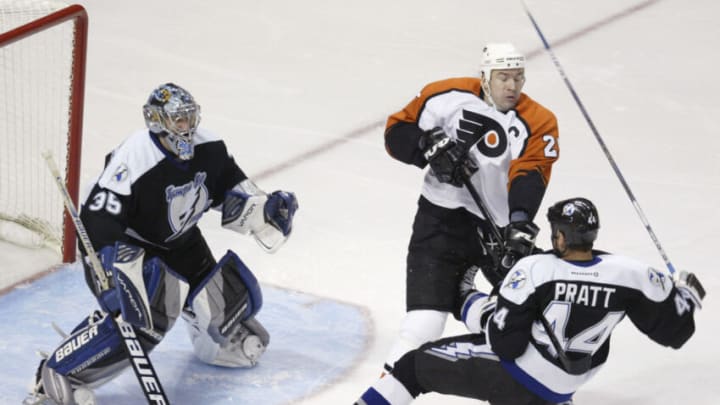
When I was in high school, the Legion of Doom Era of the Philadelphia Flyers had commenced. As the team got into the late 1990s, it seemed that the Stanley Cup was just in our grasp…but not quite. Sometimes, it was that we ran into a hot goalie; usually Martin Brodeur.
Sometimes it was the wrong team. For example, the Flyers would have a physical series that ran six or seven games with a team like Toronto or Buffalo only to run into a speedy, finessed team like Ottawa. The Flyers would run out of gas and lose out, again in six or seven.
But still, the dream was there. We were oh so close so many times. The Detroit Red Wings swept us in 97 (my senior year in high school). Then the Eric Lindros Era turned kind of sour as he and GM Bobby Clarke publicly feuded. In 2001, the Flyers were on the brink of winning the Eastern Conference with a 3-1 lead over the hated New Jersey Devils. We all know how it ended. Scott Stevens hit Lindros and the series was effectively over, even though it was just game six.
That offseason, Lindros was traded away. A new team was built. Jeremy Roenick, a superstar from Chicago and Phoenix, was brought in as his replacement. But at this point, Keith Primeau was “the man” on this team. Once again, the team would flounder in the first round of the playoffs.
The following year, Clarke would hire Ken Hitchcock, who previously won a Stanley Cup with the Dallas Stars, to be his head coach. They lost to the Senators in the second round of the playoffs, but the stage was set for the 2003-04 season.
Flyers: The Roster
First of all, it starts with the coach. Clarke, who normally pulled the trigger on a coach took his time with Hitch. It paid off well as the team had a great season. The team won the Atlantic Division and would be third overall in the Eastern Conference.
But after him, this was a veteran team filled with hall of famers, borderline hall of famers, and young stars waiting in the wings. Mark Recchi is the only guy on this team currently in the Hall of Fame, but you could make serious arguments for John LeClair, Roenick, and Justin Williams.
Alongside them were veteran stars Primeau, Tony Amonte, Michael Handzus, Alexei Zhamnov, Marcus Ragnarsson, Eric Desjardins, Chris Therien, and Sami Kapanen. Filling in the ranks were young studs like Simon Gagne, Patrick Sharp, Joni Pitkanen, and Kim Johnsson.
If you wanted muscle, the Flyers also had Claude LaPointe, Todd Fedoruk, and Donald Brashear. If you wanted speed, look for Gagne and Kapanen. A power play of Recchi, Roenick, and LeClair would devastate you.
In short, this was a team that was loaded. Five Flyers scored 20+ goals that season: Recchi (26), Gagne (24), LeClair (23), Handzus (20), and Amonte (20) with Roenick chipping in with 19. Recchi led the way for the Flyers leading in goals, assists (49), and total points (75).
The goalies were a rotation of Robert Esche and veteran Jeff Hackett. Esche, who was acquired for Brian Boucher the year before, was the starter after the Flyers dispatched Roman Cechmanek. For a team loaded with all-star talent, a young goalie with a solid veteran backup, a reliable defense, and a determined coach, this was the team that was going to get us to the NHL’s Holy Ground.
However, Therien would be traded for draft picks at the deadline. In order to shore up the goalie situation after Hackett was diagnosed with vertigo, the Flyers traded for Sean Burke. Midway through the season, the Flyers also traded away Williams for Danny Markov; a defender who didn’t do much for Philly. Looking back, you wonder if Williams or Therien, along with veteran defender Eric Weinreich (trade for draft picks) would’ve made a difference.
